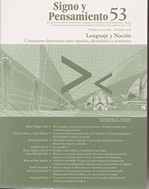Abstract
Body building technologies are a set of technical objects and practices of sorts that, together with certain discourses and statements, contribute to the composition of subjectivities. Even when cosmetics are presented as an anatomic policy tool used to reconfigure and standardize people’s bodies, and at the same time, as a device that makes possible the impingement of the norms that regulate body building, our main goal is to deconstruct the vision of the body as a sort of ontological material prior to its contact with the world, and to stress the importance of technology, not as a mere artificial addition, but rather as a condition of possibility for the human being.This journal is registered under a Creative Commons Attribution 4.0 International Public License. Thus, this work may be reproduced, distributed, and publicly shared in digital format, as long as the names of the authors and Pontificia Universidad Javeriana are acknowledged. Others are allowed to quote, adapt, transform, auto-archive, republish, and create based on this material, for any purpose (even commercial ones), provided the authorship is duly acknowledged, a link to the original work is provided, and it is specified if changes have been made. Pontificia Universidad Javeriana does not hold the rights of published works and the authors are solely responsible for the contents of their works; they keep the moral, intellectual, privacy, and publicity rights.
Approving the intervention of the work (review, copy-editing, translation, layout) and the following outreach, are granted through an use license and not through an assignment of rights. This means the journal and Pontificia Universidad Javeriana cannot be held responsible for any ethical malpractice by the authors. As a consequence of the protection granted by the use license, the journal is not required to publish recantations or modify information already published, unless the errata stems from the editorial management process. Publishing contents in this journal does not generate royalties for contributors.


